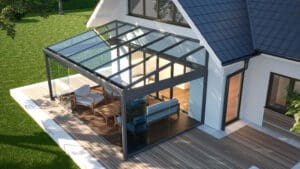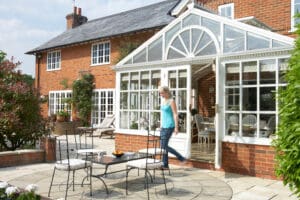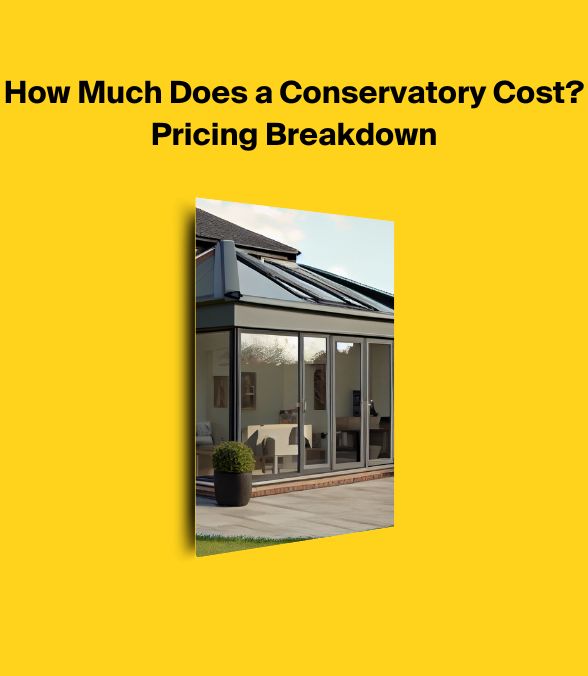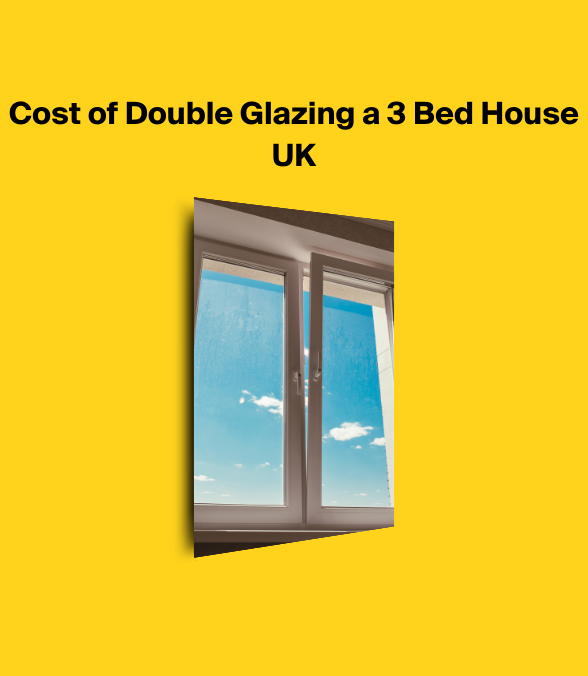Choosing the perfect conservatory roof type is key to matching your home’s style and optimising energy efficiency.
In this article, we discuss various conservatory roof types, outlining the pros and cons of glass, polycarbonate, tiled, and hybrid roofs to simplify your decision. Discover the best fit for your conservatory with our focused insights on conservatory roof types.
Types of Conservatory Roof Overview
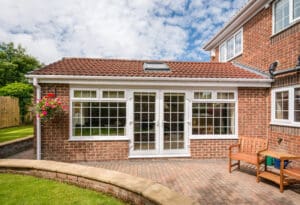
- Different conservatory roof types, such as glass, polycarbonate, and tiled roofs, each offer unique benefits and drawbacks in terms of style, light transmission, insulation, and cost.
- Essential factors to consider when choosing a conservatory roof include budget, maintenance, energy efficiency, and aesthetics, with long-term cost-effectiveness being as important as upfront costs.
- Hybrid conservatory roofs combine the advantages of both solid and glass roofs, offering better insulation and a more comfortable living environment. However, they may require a higher initial investment and expertise in installation.
Exploring the Different Conservatory Roof Types
Whether you’re looking for a classic Victorian style or a modern Lean-To, conservatories come in a variety of conservatory roof styles. These range from:
- Gable
- Edwardian
- P-shaped
- L-shaped
Roofs can be made of materials such as glass roof, polycarbonate, and tiles, each offering different advantages and challenges.
Here’s a detailed overview of these options.
Glass Conservatory Roofs
Glass conservatory roofs are a popular choice among various conservatory roof options, offering a unique blend of aesthetic appeal, abundant natural light, and improved energy efficiency. These glass roofs give your conservatory a bright and airy feel, with a variety of glazing options such as ‘Active Blue,’ ‘Neutral,’ Green, and ‘Clear’ to suit your style preferences.
Thanks to advancements in glazing technologies, glass conservatory roofs now offer enhanced performance, with insulated glass significantly improving energy efficiency by managing solar gain for optimal indoor temperatures year-round.

Build your window today!
Get a Quote
Polycarbonate Conservatory Roofs
For those on a budget, a polycarbonate conservatory roof might be the go-to option. Known for their durability and lightweight properties, polycarbonate conservatory roofs offer design flexibility with different levels of transparency. However, they do come with their set of challenges. They have lower energy efficiency, resulting in less effective temperature control inside the conservatory.
Furthermore, sound insulation is a significant drawback of polycarbonate roofs, potentially affecting your property’s value.
Tiled Conservatory Roofs
Tiled conservatory roofs are a preferred choice for those prioritising superior insulation and energy efficiency. Although they require additional structural support due to the weight of the tiles, a tiled conservatory roof provides excellent insulation, reducing the amount of natural sunlight entering the conservatory. This can be a boon for protecting interior furnishings from sun-fading.
With a wide range of tile options available, homeowners can customise their roof to match their aesthetic preferences, further enhancing the appeal of their conservatory.
Read more - Different types of conservatories
Key Factors to Consider When Choosing a Conservatory Roof
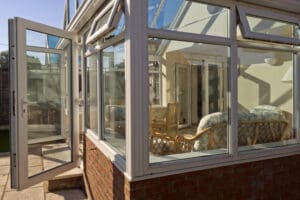
Choosing the right conservatory roof goes beyond picking a style you like. It’s about considering key factors like:
- your budget
- the required maintenance
- energy efficiency
- the aesthetics of the roof
We will discuss these considerations in detail.
Budget
Your budget plays a critical role in determining the type of conservatory roof you can afford. However, it’s not just about the upfront cost; it’s also about assessing the long-term cost-effectiveness of the roof. Polycarbonate roofs, for example, are the least expensive option but offer lower quality compared to other materials.
On the other hand, while glass conservatory roofs are more affordable than tiled roofs, they require less labor for installation. The cost of solid conservatory roofs with tiles can vary depending on the type of tiles chosen, with some being pricier than others.
Maintenance
Maintenance is another crucial factor in the decision-making process. Roofs that require less maintenance and have a longer lifespan may be more cost-effective over time. For example, while glass and polycarbonate roofs require regular cleaning, tiled roofs are more resistant to discoloration and organic growth.
Additionally, upgraded conservatory roofs enhance durability and reduce maintenance needs over time, with materials like tiles significantly lengthening a roof’s lifespan.
Energy Efficiency
Energy efficiency is a key aspect when choosing a conservatory roof. Tiled conservatory roofs offer superior insulation, trapping heat in winter and blocking solar heat in summer, contributing to reduced heating bills. Hybrid conservatory roofs balance solid and glazed sections to maintain a comfortable temperature year-round, positively influencing energy bills and decreasing the carbon footprint.
It’s worth noting that poor quality roofing systems can lead to energy inefficiency issues, such as mold and drafts due to inadequate ventilation, insulation, and waterproofing.
Aesthetics
Aesthetics is another important factor to consider when choosing a conservatory roof. Tiled conservatory roofs offer a variety of styles and colors that allow for seamless aesthetic integration with your home’s existing character. Alternatively, hybrid conservatory roofs provide versatile glazing options, enabling a balance between style, natural light, and energy efficiency.
The architectural design of hybrid roofs can enhance your home’s modern appearance, adding a contemporary and classy appeal.
Hybrid Conservatory Roofs: The Best of Both Worlds?
After discussing glass, polycarbonate, and tiled roofs, we will now introduce an innovative option that merges the strengths of these materials: hybrid conservatory roofs. These unique roofs blend glass and solid tiled roof elements, providing a balance between maintaining an outdoor feel while being functional and temperature-controlled.
Pros of Hybrid Conservatory Roofs
Hybrid conservatory roofs bring together the pros of different roof types, offering:
- Improved insulation
- A balance between outdoor connection and temperature control
- Insulated glass to harness a small solar gain
- Solid sections that trap heat, keeping the conservatory warm for longer durations.
Moreover, they are adaptable to various styles of conservatories, allowing for personalised aesthetic choices like decorative cornices.
Cons of Hybrid Conservatory Roofs
While hybrid conservatory roofs offer significant benefits, they also come with a few potential downsides. Due to their bespoke nature and the mix of materials and design elements, these roofs can be more expensive than standard glass or polycarbonate roofs.
Additionally, the installation process for hybrid conservatory roofs is often more complex, requiring specialised skills and expertise.
Building Regulations and Planning Permission
Regardless of the conservatory roof type you opt for, awareness of building regulations and planning permission requirements for a conservatory is important. These crucial aspects ensure the safety, structural integrity, and compliance with local laws of your conservatory roof project.
Building Regulations
Building regulations approval is necessary for certain conservatory roof projects. If you’re creating a new structural opening between the conservatory and the existing home, or replacing a glass or polycarbonate roof with a tiled one, you’ll need to verify that the existing structure can bear the additional weight. Furthermore, conservatories must adhere to specific building regulations, such as:
- Using double glazing with Argon gas
- Complying with electric installation standards
- Possibly adding a ventilation system for areas exceeding 30 square meters.
Planning Permission
In most cases, planning permission isn’t needed for conservatory roof projects, provided certain conditions are met. For instance, you typically won’t need permission if:
- The alteration doesn’t result in the conservatory extending beyond half the floor space of the adjoining property
- The height doesn’t surpass that of the main property
- It doesn’t include a veranda, balcony, or raised platform.
However, if you’re changing from a translucent to a solid roof, you might need planning permission, as this may change the conservatory’s classification from ‘temporary’ to ‘permanent’.
Conservatory Roof Replacement: Costs and Considerations
If you’re considering to replace an old conservatory roof or install a new one, it’s important to understand the costs and considerations involved. Understanding these factors will help you make an informed decision that aligns with your budget, needs, and aesthetic preferences.
Factors Affecting Conservatory Roof Replacement Cost
Several factors can influence the cost of a conservatory roof replacement. The size of the conservatory is a significant cost factor, with smaller conservatory roofs starting from £2,600, scaling to over £7,500 for larger installations. Material choices for the roof range in cost from polycarbonate as the least expensive, to glass which is more costly, and tiled roofs being the most expensive option.
Additionally, the price of a conservatory roof replacement can also be influenced by the selection of the installer, with smaller roofing companies sometimes offering lower rates and potential VAT savings.
Long-Term Benefits of Roof Replacement
Replacing a conservatory roof offers numerous long-term benefits. It enhances the room’s usability and turns it into a versatile living space that can be enjoyed in every season. Moreover, energy efficiency is significantly improved with a new conservatory roof, leading to reduced energy bills and a comfortable climate year-round.
A roof replacement can:
- Improve the energy efficiency of your home
- Enhance the aesthetic appeal of your conservatory
- Increase the value of your property
- Provide long-term durability and savings on maintenance
Overall, a roof replacement is a valuable investment for your home.
Summary
In summary, choosing the right conservatory roof involves considering several key factors, from the type of material and budget to energy efficiency and aesthetics. Whether opting for glass, polycarbonate, or tiled roofs, or even a hybrid combination, each choice offers unique advantages and challenges.
Remember to ensure your project complies with building regulations and planning permission requirements. Ultimately, investing in a conservatory roof replacement can enhance the space’s usability, improve energy efficiency, and add a modern touch to your home, making it a worthwhile investment.

Build your window today!
Get a Quote
Frequently Asked Questions
What is the best type of roof for a conservatory?
A glass roof is the best type for a conservatory since it can help save on energy bills, is longer-lasting, and can withstand the elements better than polycarbonate. Glass roofs also offer options for tinted or self-cleaning glass.
How much is a conservatory?
The average cost of a conservatory usually ranges from £10,000 to £35,000, depending on the size, style and materials used for the conservatory.
What are old conservatory roofs made of?
Old conservatory roofs were often made from glass panes or thin sheets of polycarbonate, which made the room beneath poorly insulated and unusable for weeks at a time.
What is the cheapest option for a conservatory roof?
The cheapest option for a conservatory roof is polycarbonate. It's affordable, lightweight, and easy to install, but may not be as durable as glass or tiled roofs.
What is the alternative to a polycarbonate conservatory roof?
The alternative to a polycarbonate conservatory roof is a glass conservatory roof, which is much more energy efficient and can achieve a lower U value. This can help reduce heat loss and energy consumption in your conservatory.
What are the main types of conservatory roofs?
The main types of conservatory roofs are glass, polycarbonate, and tiled roofs, each offering different advantages and challenges in terms of aesthetics, insulation, and cost. Choose the type that best fits your preferences and needs.



